Francis Conroy Sullivan
Francis Conroy Sullivan (July 2, 1882 – April 4, 1929) was a Canadian architect.
Francis Conroy Sullivan | |
|---|---|
| Born | July 2, 1882 Kingston, Ontario, Canada |
| Died | April 4, 1929 Scottsdale, Arizona, United States |
| Nationality | Canadian |
| Occupation | Architect |
| Projects | O'Connor Street Bridge; Banff National Park Pavilion, |
The only Canadian pupil of Frank Lloyd Wright aside from Roger d'Astous, Sullivan worked in the Oak Park studio in 1907 but returned to Ottawa in 1908. Sullivan brought the modernist Prairie School style to Canada, building a number of prominent structures, often in the Prairie Style.
Sullivan was born in Kingston, Ontario. He was an architect for the Canadian Department of Public Works from 1908 to 1911, after which he had an independent practice in Ottawa until 1916. In this capacity he frequently designed schools for the Ottawa Catholic School Board. In 1920 he moved to Chicago and became the chief architect for the Chicago Public School Board.
Examples of Sullivan's work include:
- The O'Connor Street Bridge in Ottawa, Ontario, Canada – 1907
- 108 Acacia Ave., Ottawa - 1908
- Gainsborough Apartments, 285-291 Metcalfe Street, Ottawa - 1911[1]
- The Banff National Park Pavilion, (with Frank Lloyd Wright), Banff National Park, Alberta, Canada – 1911
- No 7 Fire Station Arthur St., Ottawa – 1912
- Apartment House 204 Laurier Ave. E., Ottawa – 1913
- Ecole du Sacré Coeur (now School House Lofts), 19 Melrose Ave., Ottawa – 1912[2]
- Pembroke Public Library, 237 Victoria St., Pembroke, Ontario, Canada – 1913
- Horticulture Building, Lansdowne Park, Ottawa – 1914
- Francis C. Sullivan House, 346 Somerset St. E., Ottawa – 1914
- Patrick J. Powers House, 178 James St., Ottawa – 1915
- Edward P. Connors House, 166 Huron Ave. N., Ottawa – 1915
- Ransome W. Dunning Residence 99 Acacia Ave., Ottawa
- Stonewall Post Office (Now a prominent antique shop and bookstore), 357 Main Street, Stonewall, Manitoba, Canada – 1915[3]
- Church of Ste-Claire de Goulbourne (now St. Clare's Catholic Church), near Dwyer Hill, Ontario – 1915[4]
- St. Martin of Tours Church, Glen Robinson Ont. (Destroyed by fire in the 1950s).
- 6 Allan Pl., Ottawa
- Shawville Post Office, 100 Victoria Ave., Shawville, Quebec, Canada – 1917
- Orthopedic Hospital, North Toronto Military Hospital – 1917
- Service Storehouse North Toronto Military Hospital – 1917
- Military convalescent Home, Coburg, Ont. – 1917
- Sir Oliver Mowat Sanatorium, Kingston Ont. – 1917
- Infirmary Building, Provincial Sanatorium, Kentville N.S. – 1917
- Military Convalescent Home, Guelph, Ont. – 1917
- The Lindenlea Housing Project, Ottawa – 1919-21
- Bartholomew Armstrong Residence, 8 McLeod St., Ottawa – 1924
- Steinmetz High School, N. Mobile St. Chicago – 1925
- Calumet High School. E. May St., Chicago – 1925
- Edward J. Kelly Estate, Vilas County, near Eagle River, Wisconsin, United States – 1925[5]
Although influenced by Wright, Sullivan's work diverged from Wright's in certain important ways. For example, whereas horizontals predominate in Wright's creations, Sullivan used strong verticals to create tension in his designs.
Sullivan went to Chandler, Arizona while in Wright's employ, and died there on April 4, 1929.[6]
Gallery
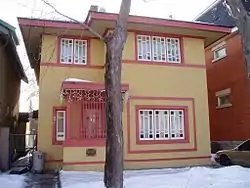 The house in the Sandy Hill, neighbourhood of Ottawa that Sullivan designed for himself in 1913. |
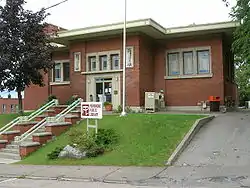 The Pembroke Public Library. |
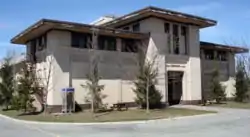 Horticulture building at Lansdowne Park, Ottawa. |
|||
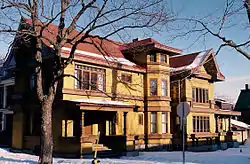 Patrick J. Powers Residence at James and Bay in Ottawa Ontario |
 Bridge over Patterson Creek on O'Connor Street, Ottawa. |
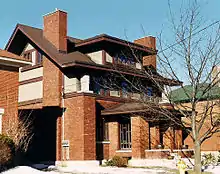 Edward J Conners Residence at 166 Huron St. Ottawa Ontario |
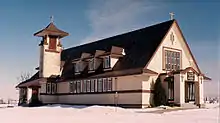 Ste. Claire de Goudbourne Church, Dwyer Hill Ontario |
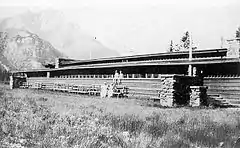 Banff National Park Pavilion, circa 1920 |
References
- "A TALE OF TWO FRANCIS SULLIVAN BUILDINGS". Retrieved 2018-11-20.
- "Heritage architecture combines with modern detailing in School House Lofts", The Ottawa Citizen, at www.canada.com Archived 2012-11-08 at the Wayback Machine
- "The Prairie School Traveler". www.prairieschooltraveler.com.
- "The Prairie School Traveler". www.prairieschooltraveler.com.
- The Prairie School, Harold Allen Brooks*
- The Weekly Home News newspaper, 2/14/1929: p. 1: notice that "F. Sullivan, architectural engineer and John Davies, both of the Taliesin staff, left Friday to join their employer, Frank Lloyd Wright, at Chandler, Arizona."
Bibliography
- Birkans, Martin (1975). The Life and Work of Francis C. Sullivan, Architect, 1882-1929:. Canada: Unpublished Masters degree from the University of Toronto.
External
External links
| Wikimedia Commons has media related to Francis Sullivan. |